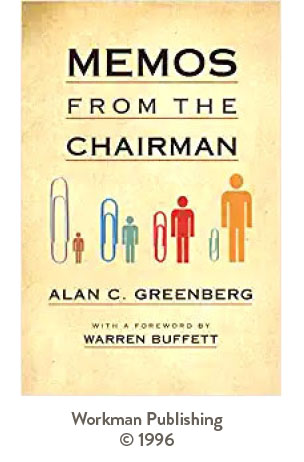“When mortals go through a prosperous period, it seems to be human nature for expenses to balloon. We are going to be the exception,” wrote Alan Greenberg, chair of Wall Street firm Bear Stearns, in one of his famous memos exhorting partners to watch expenses like a hawk and pinch every penny. It’s perfectly sensible advice.

But then he goes off the deep end a little and declares the firm will no longer approve the purchase of paper clips. They’re a waste of money, he thinks, when there are plenty of paper clips already circulating around the office. Diligently collect them, and you’ll soon be awash in more than you need.
Was he joking? It’s hard to tell. But the tongue does seem planted firmly in cheek a few lines later when he rhapsodizes about selling the firm’s surplus paper clips at a profit (“…since the cost to us is zero, the Arbitrage Department tells me the return on capital will be above average.”) The man did have a sense of humor.
He also had a point, which was that getting petty on expenses instilled a shared mindset that, “All of us are going to help the bottom line grow.”
Alan Greenberg started out as a clerk at Bear Stearns in 1949 after getting rejected by five white-shoe Wall Street firms. He moved to the trading floor (which he loved), became chief executive in 1978, and then chairman in 1985. According to his obituary in The New York Times, “Mr. Greenberg’s nickname was ‘Ace,’ and he kept a deck of cards on his desk, ready to deal. He was a champion bridge player, a magician who conjured coins with sleight of hand, a show-off who could whiz-bang a yo-yo, an adventurer who played pool with sharks and stalked game in Africa.”
He also was a colorful writer. His memos, collected in the classic book shown here, push, pull, and nag his employees through Bear Stearns’ rapid rise between 1978 and 1995. They are funny, whimsical, sometimes stern — and probably rubbed people the wrong way at times. But Greenberg keeps things light by invoking an alter ego — the wisecracking and ridiculously named Haimchinkel Malintz Anaynikal — to impart his most important messages and business philosophies.
In his forward to the book, Warren Buffett says there’s a lot to learn from Haimchinkel, who is “cheap, smart, and opinionated.” And Jeff Bezos (who famously made employees pay for their own parking at Amazon), keeps Memos From the Chairman on his required reading list.
But there’s more to Greenberg’s memos than saving money on paper clips (and rubber bands, scotch tape, electricity, and nearly everything else). More than anything, Greenberg’s overriding message is to always “stay humble, humble, humble” and be wary of arrogance and complacency, especially in bull markets. “Humans tend to get sloppy when making money is easy.” That’s the time to “not confuse luck with brains” and remember that “this picnic will not last.” In an especially good market in 1985, Greenberg laments, “Things are too good!! . . .Let us continue to watch the shop and realize that none of us are really very smart. We are just in the right place at the right time.”
A born contrarian, Greenberg also sees bad markets as times of opportunity. He hires and expands when his rivals fire and downsize (a great time to pick up top talent). He enters businesses when his competitors exit them. He reminds everyone that “big money is usually made by contrarians,” and that “our best moves were made against the thinking of the masses.”
Readers will learn that Greenberg is a stickler about answering the phone in two rings, ensuring receptionists are polite, and returning calls to everyone and anyone immediately. He also has a strict rule to never knock other Wall Street firms in public. “Bear Stearns people do not denigrate our competition,” he writes. “If you cannot say something nice about somebody, do not say it!”
But perhaps Greenberg is most human in the bleakest of times and the toughest of markets. He pushes the troops to keep their chins up and reminds them that markets always turn – sometimes very quickly, though “a bell will not ring to prepare you for the good times.” Bad markets are really nothing to worry about, he says. “This is nothing next to Auschwitz, Buchenwald or Vietnam . . .This market will not get me down. It is just a minor challenge.”